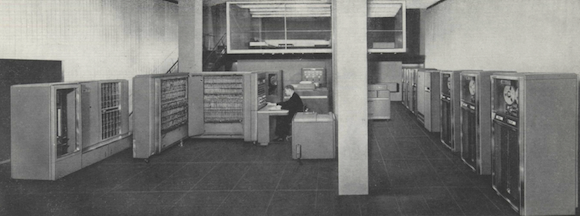The very first Fortran guide

Have you ever written code in Fortran? Even if the answer is no, you probably use systems that have been developed or work on it. This is the first high-level programming language using abstractions. We can say that it was with Fortran that modern programming was born.
This year marks the 56th anniversary of the very first Fortran user guide, released October 15, 1956. You can download it here .

The Fortran language was developed by IBM in the 1950s. Despite the fact that Fortran is now not as popular as it once was, it ranks 26th in the TIOBE (TIOBE Programming Community Index).
Also, relatively recently Fortran is named"The ideal programming language for HPC" (high performance computing). Although, this should not be very surprising, since the standard software that is used in the world's top 500 supercomputers is written in Fortran.
Fortran was originally developed as an alternative to assembler for the IBM 704 computer (shown in the picture below). A rough description of the Fortran language called “PRELIMINARY REPORT. Specifications for the IBM Mathemaical FORmula TRANslation System, FORTRAN ”was completed in 1954. But despite this, the first guide was published several years later in 1956, and the first compiler became available in 1957.

The Fortran manual, dated October 15, 1956, was written by IBM's Programming Research Group and Applied Science Division. The introduction of this document reads: “The system for translating mathematical formulas, or briefly FORTRAN, will contain a large number of programs that will allow the IBM 704 computer to perceive the description of the problem in terms of mathematical notation and automatically create a highly efficient program for solving it.”
According to John Backus, head of the development team, most of the work was aimed at “being lazy,” because he really didn’t like writing programs for IBM 701 in assembler.
You can try Fortran today, there are many different options, including GNU Fortran .
